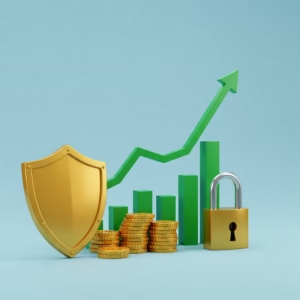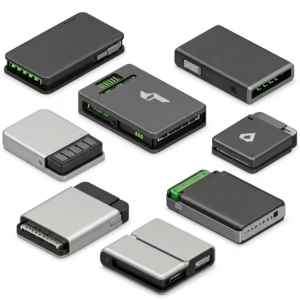Learn how to store your cryptocurrencies safely
Complete guide to safely storing your digital currencies

So, you’ve ventured into the exciting world of cryptocurrencies! That’s fantastic. But just like protecting any valuable asset, ensuring the security of your digital coins is paramount. Losing your crypto due to inadequate security measures can be a costly mistake. This guide will walk you through the essential steps and best practices to safeguard your cryptocurrency investments and prevent crypto theft, even if you’re new to the digital asset space.
Understanding Crypto Wallets: Your Digital Vault for Secure Cryptocurrency Storage

Think of a crypto wallet as a digital bank account specifically designed for cryptocurrencies. However, unlike traditional banks, you are solely responsible for the security of your wallet. Understanding the different types of wallets is the first step towards choosing the best crypto wallet for security.
Hot Wallets vs. Cold Wallets: Choosing the Right Balance of Convenience and Security
There are two main categories of crypto wallets:
- Hot Wallets: These wallets are connected to the internet, making them convenient for frequent trading and transactions. Examples include software wallets (desktop and mobile apps) and online exchange wallets. While user-friendly, their internet connectivity makes them potentially more vulnerable to hacking attempts. It’s generally advisable to keep smaller amounts of crypto in hot wallets for regular use.
- Cold Wallets: These wallets are offline, providing a much higher level of security against online threats. Hardware wallets (physical devices resembling USB drives) and paper wallets (printed private and public keys) fall into this category. Cold wallets are ideal for long-term secure storage of large cryptocurrency holdings.
Software Wallets: Convenience at Your Fingertips, But Security Requires Vigilance

Software wallets are applications you install on your computer or smartphone. They offer ease of use and quick access to your funds. To maximize software wallet security, ensure you:
- Download from official sources: Only download wallets from the official website of the provider to avoid malware.
- Enable two-factor authentication (2FA): This adds an extra layer of security by requiring a second verification step beyond your password.1
- Keep your software updated: Updates often include security patches that protect against new threats.
- Use strong, unique passwords: Avoid easily guessable passwords and reuse across multiple platforms.
Hardware Wallets: The Gold Standard for Secure Offline Crypto Storage
Hardware wallets are physical devices that store your private keys offline. They are considered the most secure way to store2 significant amounts of cryptocurrency because they are isolated from the internet. Key features that enhance hardware wallet security include:
- Private keys stored offline: Your sensitive information never touches the internet.
- PIN protection: Access to the device requires a PIN, protecting against unauthorized physical access.
- Recovery phrase: A set of words that allows you to recover your funds if your device is lost or damaged. Store your recovery phrase securely offline and never share it with anyone.
Paper Wallets: A Basic Form of Cold Storage, Handle with Care

Paper wallets involve printing your public and private keys on a piece of paper. While they offer offline storage, they require careful handling and are less convenient for frequent transactions. If using a paper wallet for basic secure crypto storage, ensure:
- Secure generation: Use a reputable offline tool to generate your keys.
- Safe storage: Keep the paper in a secure, dry, and fireproof location.
- Careful handling: Avoid folding or damaging the paper, as this could make the keys unreadable.
Essential Security Practices to Protect Your Cryptocurrency Investments
Regardless of the type of wallet you choose, adopting these fundamental security habits is crucial for keeping your crypto safe from hackers and scams:
Implement Strong Passwords and Unique Credentials for All Crypto-Related Accounts
Using strong, unique passwords for your exchange accounts, email associated with crypto, and wallet access is a basic yet vital security measure. A strong password includes a mix of uppercase and lowercase letters, numbers, and symbols. Avoid using personal information3 or easily guessable words.4 Consider using a password manager to securely store and generate complex passwords.
Enable Two-Factor Authentication (2FA)5 Wherever Possible for Enhanced Account Security

As mentioned earlier, 2FA adds an extra layer of protection by requiring a second verification code, usually sent to your phone or generated by an authenticator app, in addition to your password. This significantly reduces the risk of unauthorized access, even if your password is compromised.6 Always enable 2FA on your crypto exchange accounts and any wallets that offer this feature.
Be Vigilant Against Phishing Scams and Social Engineering Tactics Targeting Crypto Users
Scammers are constantly devising new ways to trick individuals into revealing their private keys or sending them cryptocurrency. Be wary of unsolicited emails, messages on social media, or phone calls asking for your personal information or wallet details. Never share your private keys or recovery phrase with anyone. Double-check the legitimacy of websites and communications before entering any sensitive information.
Keep Your Devices and Software Updated to Protect Against Vulnerabilities
Regularly updating your operating system, antivirus software, and crypto wallet applications is essential for patching security vulnerabilities that hackers could exploit. Enable automatic updates whenever possible to ensure you have the latest security protections in place.
Use Secure Internet Connections and Avoid Public Wi-Fi for Sensitive Crypto Transactions

Public Wi-Fi networks are often unsecured, making it easier for malicious actors to intercept your data. Avoid accessing your crypto wallets or conducting sensitive transactions on public Wi-Fi. Use a secure home network or a Virtual Private Network (VPN) when accessing your crypto on the go.
Back Up Your Wallet and Store Recovery Phrases Securely Offline
Creating backups of your wallet files and securely storing your recovery phrases offline is crucial for recovering your funds if your device is lost, stolen, or damaged. Write down your recovery phrase on paper and store it in a safe and separate location from your device. Never store your recovery phrase digitally or take a photo of it.
Taking Control of Your Crypto Security: Empowering Yourself Against Threats

Securing your cryptocurrency requires vigilance and a proactive approach. By understanding the different types of wallets, implementing strong security practices, and staying informed about potential threats, you can significantly reduce the risk of losing your digital assets. Take control of your crypto security today and enjoy the peace of mind that comes with knowing your investments are well-protected.





